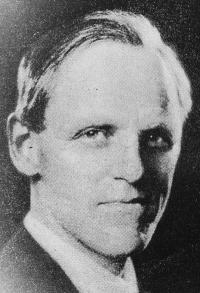Geoffrey O'Hara
 Geoffrey O'Hara (February 2, 1882 – January 31, 1967) was a Canadian American composer, singer and music professor.
Geoffrey O'Hara (February 2, 1882 – January 31, 1967) was a Canadian American composer, singer and music professor.O'Hara was born in Chatham, Ontario, Canada. He initially planned a military career. O'Hara entered the prestigious Royal Military College of Canada in Kingston, Ontario at age 18 and he trained with the 1st Hussars. He had to abandon his military career upon the death of his father, Robert O'Hara.
He moved to the USA in 1904, the same year he began performing in Vaudeville. He began recording for Edison Records in 1905. In 1913 O'Hara undertook the recording of traditional Indian songs on behalf of the American government. He was recorded on phonograph cylinder lecturing about the complexity of the music as well as singing and playing several types of Navajo traditional songs in 1914. During World War I he was a singing instructor of patriotic songs for American troops. In 1919 he married Constance Dougherty from Massachusetts, and together they had two children; the same year, he became a naturalized citizen of the United States. O'Hara lectured on music and songwriting, and held positions at Teachers' College of Columbia University (1936–37), Huron College and the University of South Dakota, where he later received and honorary Doctor of Music degree in 1947. He lectured for the remainder of his life. In 1920 O'Hara helped organize The Composers' and Lyric Writers' Protective League. He also was a board member of the American Society of Composers, Authors, and Publishers (ASCAP), was the president of the Composers-Authors Guild, and served in the United Service Organizations (USO).
 Geoffrey O\'Hara Latest Sheets Feed
Geoffrey O\'Hara Latest Sheets Feed Geoffrey O\'Hara Latest Requests Feed
Geoffrey O\'Hara Latest Requests Feed
Advertisement
Advertisement
Total 1 sheet(s) found, listing between 0 - 1.
| Song | Added By | Pages | Instruments | Sheet Type | File |
| I walked today where Jesus walked |
depaule (1)
4303d ago
|
9 | Piano, Vocal | Original |
|

